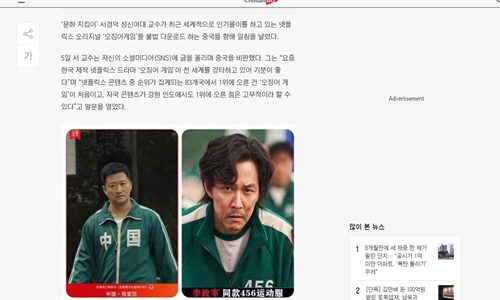
Photo: Web
Chinese experts have pointed out "obviously incorrect" public remarks made by a South Korean professor that may cast a "negative influence" on China and its relations with South Korea as their 30th diplomatic ties anniversary draws near, after the latter falsely claimed that China "copied" his country over the costume design.
As South Korean media outlet ChosunIlbo reported Tuesday, Seo Kyoung-duk, professor at Sungshin Women's University, published critical comments on Instagram indicating that a popular Chinese sportswear design has "copied" the costumes from the South Korea's hit drama
Squid Game.
Though Seo has since deleted the post, the false claim still stirred an outrage among the Chinese public, as the sportswear, worn by Chinese actor Wu Jing, was designed and presented in Chinese movie back in 2019, far before the hit South Korea's drama appeared on screens.
Playing the role as a P.E. teacher, Wu wears a dark green sportswear in China's 2019 released hit movie Song of Youth, with two characters "Zhongguo," meaning China, printed on front of the jacket.
Though appearing in the movie for only a few minutes, the figure of Wu wearing the clothes still became phenomenal among Chinese public and swirled China's social media.
"The similarity is obviously just a coincidence," Lü Chao, director of the Research Institute for Borderland at Liaoning Academy of Social Sciences, told the Global Times on Thursday.
Yet Lü believes that as a professor, Seo's remarks against China and the country's clothing is "absolutely irresponsible," and it will also "cast a shadow" over communications between the two countries.
"Professors like Seo have their own audiences and followers in South Korea. However, as a professor, it is irresponsible to make claims like Seo did, especially as she is not qualified to make remarks on these."
Furthermore, as China and South Korea established the diplomatic relations on August 24, 1992, the two countries jointly announced the launch of the 2021-22 South Korea-China Year of Cultural Exchanges in mid-September on their 30th anniversary.
With the campaign aimed at promoting deeper exchanges and cooperation in the fields of culture, art, sports, tourism and personnel, Lü noted that such remarks made by a professor may lead to "hurt feelings" between the people in the two nations and cast a reversal influence on their "deep communications."
In 2021, ceremonies and exhibitions were held across the two countries marking joint celebrations.
In late September, a grand ceremony was held to mark the 2,572nd birthday of the great ancient philosopher Confucius in the Temple of Confucius in his hometown of Qufu, East China's Shandong Province. As a way to show respect, similar ceremonies are also being held around China and in South Korea, where Confucius was also highly influential.
In mid-September, Shandong also hosted an online exhibition on the province's rich cultural heritage, as part of its campaign to introduce the Mid-Autumn Festival to overseas audiences, featuring its folk art and performances as well as culture showcases from overseas Chinese. South Korea also took part in recording the exhibition.
"People from the two countries value the communications. Yet what Seo said has clearly made a downplay of the efforts between the two nations," Lü said.




